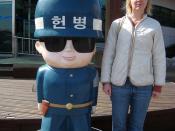In this investigation we shall explore the factors surrounding a topic which is much discussed in our society today - the level of influence Media violence have on our aggressiveness, as individuals, and as a society as a whole. We shall in particular focus on TV in this study, due to TV being the most popular Media, and also due to the limitation in size of the project itself.
We may begin this investigation by taking a look at aggression and explore briefly, where it comes from, and what influences a person's aggression in general.
We may firstly argue that there are plenty of different theoretical approaches to the study of aggression. However, none are considered to be complete explanations but we may argue that they reflect the orientation and requirements of the researchers who developed them. Biological theories consider aggressive behaviour to be innate, although specific responses can be modified by experience.
We also have the psychoanalytic tradition, where the frustration- aggression hypothesis proposes that the origin of aggressive behaviour is to be found in external factors.
Another theory of aggression is the drive theory. The drive theory argues that drives that motivate particular behaviours are acquired through experience rather than being genetically innate. Dollard et al (1939) explained that a blocked goal creates frustration which leads to aggression and onto possibly aggressive or violent behaviour. According to this theory, frustrating situation could also simply create the potential for aggression through increased anger or emotional arousal, but will only result in aggression in the presence of anger eliciting cue. We may argue that this theory also fails to fully explain aggressive behaviour.
Bandura (1977) argued that people learn aggression in three context, from family, from peers and from cultural symbols such as TV, films or books. Social learning theory...


